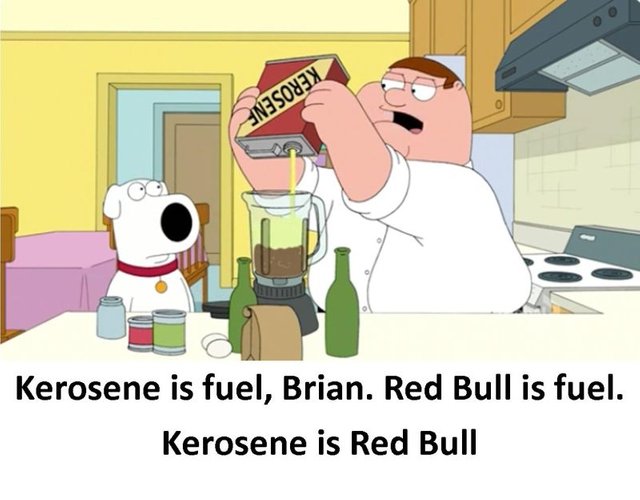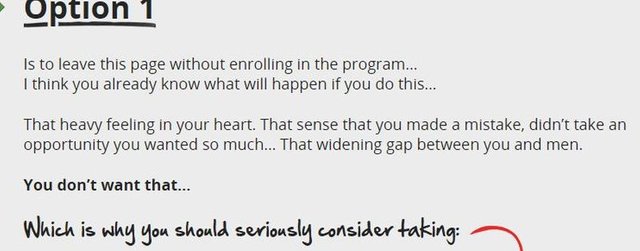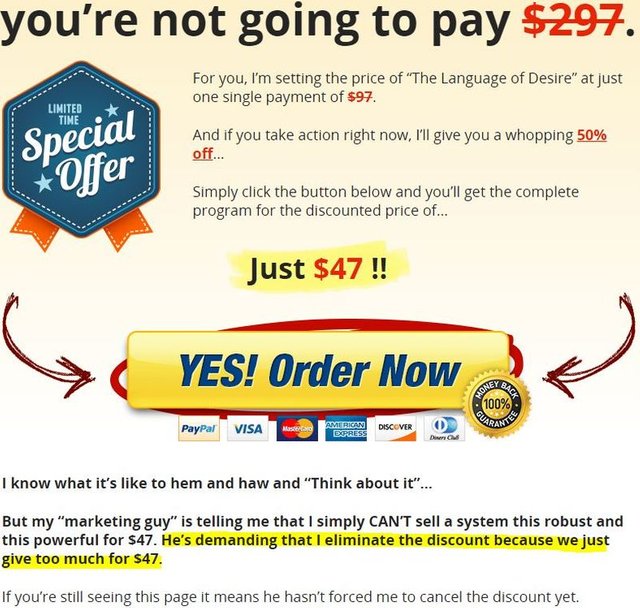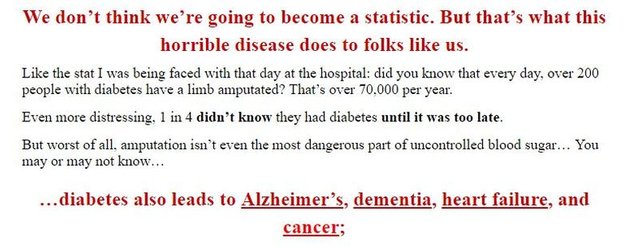
In this second part of the series, we'll discover the slightly nauseating reality of how copywriters try to manipulate you into buying whatever it is they are selling.
I think good copywriting should be clear, concise, and explain the features and benefits of a product. Many of my acquaintances are in fact copywriters. I've had countless conversations with them about the ethical implications of the tactics they use in their writing. Many of them have no issues using psychological tricks to persuade their prospects to action.
Let's get things clear; I don't have a problem with the concept of copywriting. I do have a problem with those long-winded sales pages that promise you unseen results for minimum effort. Or those extremely irritating sales videos that automatically start playing and don't have a forward button! I can see only one reason why someone would need a sales page like that: Their product is crap! They don't fill any need of the consumers, they pull a Jedi mind trick on you and create an artificial demand for their product in your head while you are reading their sales pitch.
If you have a great product that people want and need, the way you package it should be irrelevant. Sadly, in our consumer-oriented society people keep creating new products that don't bring any extra value to the community. They package it up as the hottest thing since sliced bread and persuade gullible consumers that they unquestionably need this new and shiny new gadget or course they are selling!
Here are a few of the dirtier methods they utilize:
Flawed logic

I have witnessed so called 'marketing gurus' teach this to their students. Explaining benefits of the product based on logical fallacies. This is one of the most widely used tactics by copywriters today. Just think of how the marketing world created the idea that everything natural is good. This naturalistic fallacy does not hold up to scrutiny. Nature is perfectly capable of producing harmful chemicals. But still, the message gets sent that all things natural are good for you.
However, this whole idea is based on false assertions. Some even take it a step further and manufacture their own logic. Let me give you a quick example of such fabricated logic:
Most bar owners drink beer.
People who drink beer have more chance to develop liver cancer.
Therefore if you don't want liver cancer, you should not become a bar owner.
This kind of logic infests the advertising world. And unsavory copywriters are to blame. We see this a lot with the sales of supplements and weight loss pills. Most of the logic behind those is based on flawed assumptions.
Loss aversion and fake urgency

I've looked at tons of Clickbank sales page to show you the best example of the 'loss aversion' trick. The vendor of the product above hits hard on the emotion of 'losing out'. This comes from an information product that helps women find a date. See how he uses the sentence 'That widening gap between you and men." So you better buy my product or you'll miss out on this lifetime chance!

Some even have the nerve of telling us there's only a limited amount of copies available. Yep, a limited number of copies of a digital product such as a PDF or a video series. I wonder if they can keep a straight face when they are typing up their sales pitch. They try to invoke a sense of urgency in you, heightening the fear of losing out even more.
Reciprocation & price drops

I'm sure this is something we've all witnessed before. The example above takes it to a whole new level of craziness though. First of all, you say your product costs $297, but you struck a deal with your 'marketing' guy to sell it for $47? How stupid do you think I am?
This practice is heavily used in the sale of digital products. Since there is no actual cost per item, the creator of the product can just pull the numbers out of thin air. But this also goes for almost every other product. If you buy a discounted item, the seller is still making a profit on it. Just not as big as before.


These examples play on our feeling for reciprocation. If I do you a favor, you are more likely to return a favor. The copywriter tries to create a feeling of indebtedness with the reader here. He's suggesting that he just gave a $400 gift, so you should be grateful. "feel like I won the lottery". The other example shamelessly uses the word 'presents' in its attempt to invoke the feeling of reciprocity in the reader.
Fear and desire
Marketers manipulate your emotions for their benefit. And they've been doing it for hundreds of year, if not more! But once more, the internet takes this a few stages further. Here are a few examples of what I dug up in the recesses of the web:

A particularly nasty example. Talking about amputations, dementia, and cancer. As if diabetes by itself isn't bad enough, he instills fear into people already suffering. And what's the solution? Buy his product of course!
My journey to the dark side
Two years ago I took some bad business advice and convinced myself I had to learn the skill of copywriting. The world that revealed itself to me was filled with slimy salesmen and pretentious snobs. After reading books by a few of the 'gurus,' I quickly realized this was no place for me to hang around. I started realizing how many times I fell victim to these techniques. I saw through the veil these advertisers put up. I took the red pill.
And came to the conclusion it's all bullshit. Don't insult my intelligence by claiming you're only selling 100 copies of your super-ultra-guide that will unlock the secrets of life and longevity. Admit it's a 20-page ebook about acupuncture and have a degree that you bought at an online university. Stop telling me your brand new software is 'game-changing' and revolutionary. It's probably not even out of beta!
And yet, even I went to the dark side and used these tactics. Truth be told, it did bring in more sales. But it just felt wrong. And we decided to use a more honest and open sales pitch. I value my ethics in business and feel ashamed that I resorted to such cheap methods. But I learned a lot from it, though.
The internet marketing world is a pit of despair, and I advise everyone to stay out of it. There are ethical copywriters and marketers out there, but they are few and far between. Places such as the Warriorforum is where these techniques are taught to unsuspecting newbies, keeping the practice alive. Maybe the only way to stop is to spread awareness about these psychological tricks to the masses. Or maybe the masses want to be deceived. Do they want to believe the lies?
Exactly. It is why I have stayed away from "marketing" and letting the community upvote what they want to see while they pay me for the time to organize and moderate the discussion (along with the long list of other projects that need built to open this up to everyone).
Always had a bad taste in my mouth that they had #beyondbitcoin in the "marketing" section of #bitshares forums. Marketing to me feels like using the force for evil. :P
Downvoting a post can decrease pending rewards and make it less visible. Common reasons:
Submit
....and because of your COMMUNITY BUILDING-- @menta and I know one another at all :D!
Downvoting a post can decrease pending rewards and make it less visible. Common reasons:
Submit
Downvoting a post can decrease pending rewards and make it less visible. Common reasons:
Submit
Having worked at a couple of ecommerce companies on the software development side I did the implementation and financial analysis of a lot of these methods. I had never really studied them, and when presented with "this is what we need" I thought it was amusing that the marketing team thought they would work, and I wound up extremely surprised at how well they did.
Incrementally adjusting price points over a few weeks before a big "sale" so that the sale price was actually more than the original price was one of the dirtiest I saw, and it worked better than any of the others. The other was curating a list of items that the company had too many of and which weren't selling at all and putting them on a "hot" items list to get customers to buy up all of the extra stock was one they used all of the time.
Downvoting a post can decrease pending rewards and make it less visible. Common reasons:
Submit
Oh yeah, they love doing that. Slowly increasing the price by 20% before a sales period and then showing off that they have 30% discounts....
Downvoting a post can decrease pending rewards and make it less visible. Common reasons:
Submit
Love the memes of yours. It is actually true that it is very irritating for a person seeing that video is played automatically for marketing puposes. I find it like just turn that down man. By the way nice post @menta
Downvoting a post can decrease pending rewards and make it less visible. Common reasons:
Submit
Haha those countdown clocks are such a joke, they are usually set to 10 minutes, and if you clear your browser cookies the countdown timer restarts. It's just an overused trick.
Downvoting a post can decrease pending rewards and make it less visible. Common reasons:
Submit
I agree, it's just silly. But it's not just overused, it's also just plain lying to your customers.
Downvoting a post can decrease pending rewards and make it less visible. Common reasons:
Submit